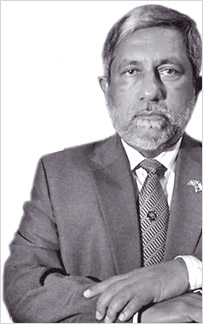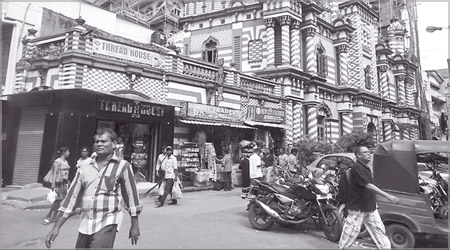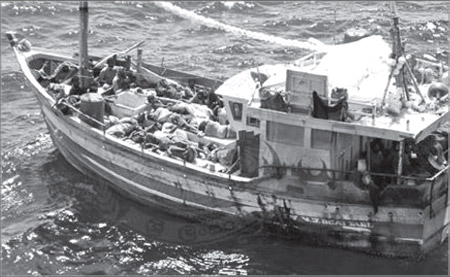Tamils flee for cash, not from harm
Dinoo Kelleghan, in Colombo The Australian
In contrast to the weary boatloads of Sri Lankans making the
dangerous asylum-shopping trip to Australia, millions of different
shoppers are out in force here as the island prepared for Sinhala and
Tamil New Year celebrations.
 |
|
Sri Lanka's High Commissioner to
Australia, Admiral Thisara Samarasinghe |
This year, economists noted a change in the spending patterns -
lower-income people are spending more freely than the better-paid
shoppers in the capital, Colombo.
The reason? The gushing torrents of remittances home from Sri Lankans
who have gone abroad for employment, often making empty claims of
persecution to leapfrog others who stand patiently in long queues
outside Western embassies in Colombo to get a work visa.
The hunger for foreign money is intense in Sri Lanka, born of decades
of dependency on remittances from those who went overseas legally to
work, and the tens of thousands who smuggled themselves out of the
country during the 30-year civil war that ended in 2009. Asylum-seeking
has become a habit, unconnected to reality, and the trawler that sailed
into Geraldton this week with 66 Sri Lankans aboard is simply a part of
that economic pattern.
People-smuggling
The number of Sri Lankans of every walk of life who have at least one
relative in Australia is astonishing. Every doctor, every lawyer,
trishaw driver I have met over the past two months after returning home
following 33 years in Australia has a family member in Melbourne or
Sydney.
Vicariously they will ask you where you have lived, whether jobs are
not plentiful, whether life is not marvellous overseas.
Yes, you can find work in Australia easily. Yes, you get money there
even if you don't work. People get free houses there, money for getting
a baby, sustained help in finding work. Just a little bit of hardship at
the start but everyone knows you'll get there in the end, and if you go
in by boat as an asylum-seeker the Australian government just has to
take notice of you, and they start looking after you straight away.
These are facts, and no matter what propaganda Canberra puts out to
deter people-smuggling, these facts are good enough to make many Sri
Lankans make a down payment of half a million rupees to a
people-smuggler and pledge to pay the rest when they start earning in
Australia, plus, for Tamils blackmailed emotionally by the
Tiger-controlled smuggling syndicates, a dollar a month for "Tamil
welfare" for the rest of time.
The civil war has been over almost four years. There is no foundation
on which Sri Lankans - Tamil, Sinhalese, Muslim or Burgher - can claim
to have a well-founded fear of persecution.
 |
|
A market
place in Colombo. Picture courtesy: The Australian |
There are a few individuals who have tense relations with government
and other political parties but my own experience as a member over seven
years on Australia's Refugee Review Tribunal indicates that embassies
here are well aware of them, share information, track them and help them
with visas for getaways.
As Sri Lanka's High Commissioner to Canberra, Thisara Samarasinghe,
said the so-called asylum-seekers were fleeing to Australia for
"economic opportunities".
"I do not consider there's any Sri Lankan should leave Sri Lankan
shores and ask for refugee status in any country," Admiral Samarasinghe
told ABC's Lateline on Wednesday night.
Tamils in the northeast who get on the boats to Australia are not
fleeing persecution but leaving for a chance of a better life.
The area has always been poorer than the rest of Sri Lanka - it is
dryer, harder to cultivate, there has never been any industry, and this
was the fault of governments since independence in 1948 but also of
industrialists, many of whom are Tamil, who never bothered to invest
there.
The decades of Tiger control of the area cemented in the poverty
while the rest of the country was starting to prosper. The Tigers, who
collected millions of dollars for development of "Eelam", merely
squatted on the land and controlled it with a fascist hand.
While life is poor and jobs are hard to find the facts are at
variance with those who claim that Tamils in the area live destitute and
face persecution from the authorities. The government-run Bank of Ceylon
in 2011 revealed that within two years after the war's end, about 40,000
displaced persons in the north who lived in the main Manik farm IDP camp
had opened new accounts and that about $US1 billion then rested in some
80,000 IDP accounts.
 |
|
Boat people
– economic refugees. File
photo |
When I interviewed some former Tiger fighters last year who are now
living normally following rehabilitation, none of them said they were
suffering from persecution even when pressed. Their problems were lack
of jobs, lack of education and training to get jobs, and difficulties
with others over contested land.
As for claims that Tamils face persecution simply for having been
actual or suspected Tiger foot-soldiers, the outgoing head of the
International Organisation for Migration, Richard Danziger, was reported
saying on April 10 that the IOM had encountered about a dozen complaints
of current harassment from the 8000 former Tigers fighters it had been
assisting. About 300 ex-militants were still in custody but 12,000 had
been through rehabilitation.
Cheaper passage to India
Even if, hypothetically, Tamils in Sri Lanka's north and east
suffered persecution they would find a much easier and shorter and
cheaper passage to India, just across the narrow Palk Strait. The fact
that some of the Tamils coming by boat to Australia originate from camps
in India in fact makes persecution claims against Sri Lanka irrelevant.
Sri Lanka's Tamil population is spread widely throughout the island,
not huddled in fearful groups in a few places.
Tamils now outnumber Sinhalese in the capital, Colombo. At least six
of the 20 billionaires on the Sri Lankan stock exchange are Tamil.
The country is doing well despite rising prices - growth is more than
6 per cent. But there are about two million Sri Lankans working abroad,
earning enough to send home about $US10bn ($9.5bn). That's the party
many Sri Lankans want to join.
Dinoo Kelleghan is a former foreign editor of The Australian and was
a member of the Refugee Review Tribunal from 1997-2004
|





